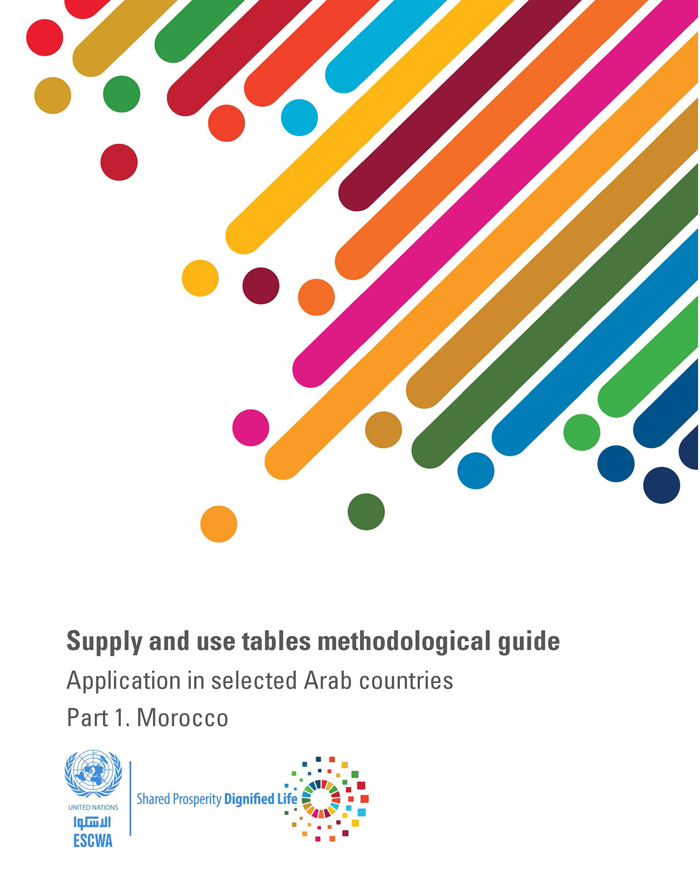
ESCWA Publication: E/ESCWA/CL4.SIT/2021/GUIDE/MOROCCO
Country: Kingdom of Morocco
Publication Type: Information material
Cluster: Statistics, Information Society and Technology
Focus Area: Statistics, Macroeconomics
Initiatives: Artificial intelligence & big data, Economic Statistics and National Accounts
SDGs: Agenda 2030
Keywords: Economic statistics, Macroeconomics, Gross domestic product, National accounts, Data collection, Statistics, Technical cooperation
Supply and use tables methodological guide- Application in selected Arab countries- Part 1. Morocco
September 2022
Supply and use tables (SUTs) are a powerful tool to compare data from different sources and improve the coherence of economic statistics, and the exhaustiveness and accuracy of the Gross Domestic Product (GDP) estimates in national accounts, through the balancing process which results in a single, reconciled estimate of GDP. They enable analyses of products and industries and allow productivity to be compiled at various levels of disaggregation to identify gaps, inconsistencies and evaluation issues in the data system and thus to improve the accuracy of the national accounts source data. SUTs also allow economists and other users to examine the internal workings of the economy, in particular detailing the contribution of specific industries and products to GDP. These statistics measure and analyse the production of products by industry, detailing the flows of products purchased by each industry, the distribution of sales for each product, and the incomes earned as an integral part of the compilation of GDP.
Most of ESCWA member countries are still lagging behind in constructing SUTs. The complexity of compiling data from various sources represents one of the main challenges to the countries in the region, and therefore this area is featured as a priority challenge to be tackled. Under the economic pillars of the United Nations Development Account on Statistics and Data, ESCWA’s statistics sub-programme planned twinning of countries (Morocco and Palestine with Jordan and Qatar), and produced two studies on the Moroccan and Palestinian practical compilation of SUTs to share knowledge and learn from their experiences. This study provides an overview on the compilation of the SUTs and expands on the case of SUTs compilation in Morocco.
Related content
Statistics
, Macroeconomics
,
Supply and use tables (SUTs) are a powerful tool to compare data from different sources and improve the coherence of economic statistics, and the exhaustiveness and accuracy of the Gross Domestic Product (GDP) estimates in national accounts, through the balancing process which results in a single, reconciled estimate of GDP. They enable analyses of products and industries and allow productivity to be compiled at various levels of disaggregation to identify gaps, inconsistencies and evaluation issues in the data system and thus to improve the accuracy of the national accounts source data. SUTs also allow economists and other users to examine the internal workings of the economy, in particular detailing the contribution of specific industries and products to GDP. These statistics measure and analyse the production of products by industry, detailing the flows of products purchased by each industry, the distribution of sales for each product, and the incomes earned as an integral part of the compilation of GDP.
Most of ESCWA member countries are still lagging behind in constructing SUTs. The complexity of compiling data from various sources represents one of the main challenges to the countries in the region, and therefore this area is featured as a priority challenge to be tackled. Under the economic pillars of the United Nations Development Account on Statistics and Data, ESCWA’s statistics sub-programme planned twinning of countries (Morocco and Palestine with Jordan and Qatar), and produced two studies on the Moroccan and Palestinian practical compilation of SUTs to share knowledge and learn from their experiences. This study provides an overview on the compilation of the SUTs and expands on the case of SUTs compilation in Morocco.


